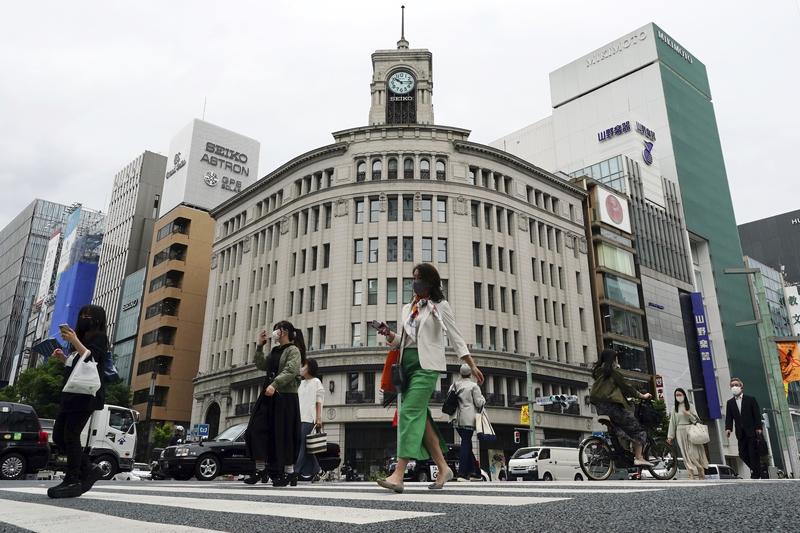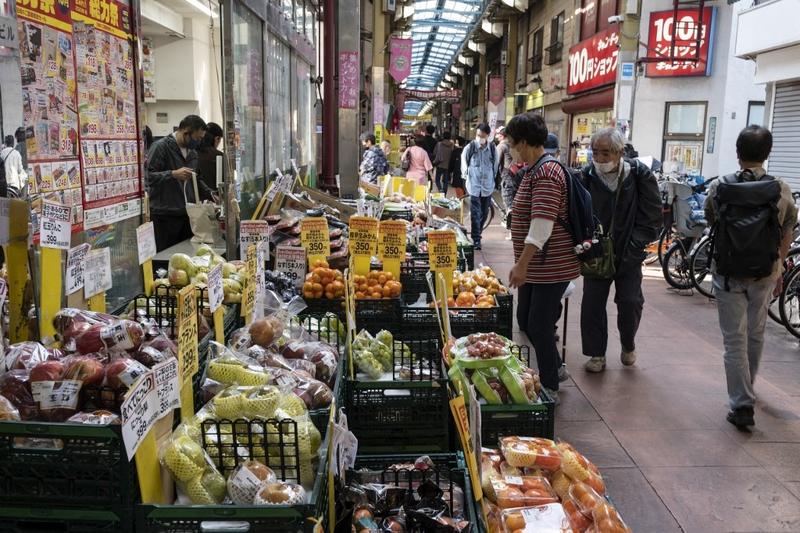 In this May 11, 2021, file photo, people wearing protective masks walk at Ginza shopping district, in Tokyo. (EUGENE HOSHIKO / AP)
In this May 11, 2021, file photo, people wearing protective masks walk at Ginza shopping district, in Tokyo. (EUGENE HOSHIKO / AP)
TOKYO - Japan's economy is expected to have slowed markedly in the third quarter as global recession risks hurt external demand while rising inflation and a weak yen's impact on imported prices forced consumers to keep their wallets shut.
Gross domestic product (GDP) data due 0850 local time Nov 15 (2350 GMT Nov 14) will likely show the world's No 3 economy grew at an annualized rate of 1.1 percent in July-September, sharply slower from the 3.5 percent expansion in the second quarter.
That would translate into quarter-on-quarter growth of 0.3 percent, according to a Reuters poll of 18 economists, also slacking off from the 0.9 percent pace in April-June.
READ MORE: Japan to curb electricity costs amid weak yen, recession risks
The significant slowdown in part highlights the harsh impact on Japan from the yen's slide to 32-year lows against the dollar, which has exacerbated the cost-of-living strains by further lifting the price of everything from fuel to food items.
Supply-side restrictions have also curbed car output… Depending on the extent of slowdown in the global economy, Japan could follow suit and you cannot rule out the possibility that it slides into recession next year
Takeshi Minami, Economist
Prime Minister Fumio Kishida's government is stepping up support for households to try to ease the effects of cost-push inflation, with a 29 trillion yen ($196.09 billion) in extra spending in the budget.
"Unlike Western countries, Japan has not experienced pent-up demand while service consumption at hotels and restaurants remains stagnant," despite easing coronavirus curbs, said Takeshi Minami, chief economist at Norinchukin Research Institute.
"Supply-side restrictions have also curbed car output," he said, adding that "depending on the extent of slowdown in the global economy, Japan could follow suit and you cannot rule out the possibility that it slides into recession next year."
ALSO READ: Japan avoids recession as shoppers ignore virus emergency
Capital expenditure that probably underpinned third quarter growth, is forecast to have risen 2.1 percent in July-September, versus 2 percent increase in the previous quarter, reflecting improved performance at big exporters and others thanks to the earnings boost from a weak yen.
 This photo taken on Oct 23, 2022 shows people looking at fruit and vegetables outside a supermarket along a covered shopping street in Tokyo. (RICHARD A. BROOKS / AFP)
This photo taken on Oct 23, 2022 shows people looking at fruit and vegetables outside a supermarket along a covered shopping street in Tokyo. (RICHARD A. BROOKS / AFP)
External demand, or net exports -- shipments minus imports -- likely shaved 0.2 percentage points off GDP, after having added 0.1 percentage point to the second-quarter gain.
Private consumption that accounts for more than half the economy, is expected to have slowed to a crawl in the third quarter with an increase of 0.2 percent from a 1.2 percent gain.
Separate data by the internal affairs ministry is also set to underline the broad pressure across the economy, with the pace of growth in household spending seen almost halving to 2.7 percent year-on-year in September from 5.1 percent gain in August.
ALSO READ: Japan's stealth yen intervention 'aims for maximum impact'
The strains on business showed no signs of easing either with input costs up sharply. Japan's corporate goods price index, a barometer of wholesale prices that companies charge each other, is forecast to increase 8.8 percent year-on-year in October, easing from the previous month of 9.7 percent.
Household spending data will be released 0830 JST Nov 8/ 2330 GMT Nov 7 and corporate goods price index is due 0850 JST Nov 11/ 2350 GMT Nov 10.
Ministry of Finance (MOF) data, due out 0850 JST Nov 9/ 2350 GMT Nov 8 will likely show the current account came to 234.5 billion yen ($1.58 billion) in September.


